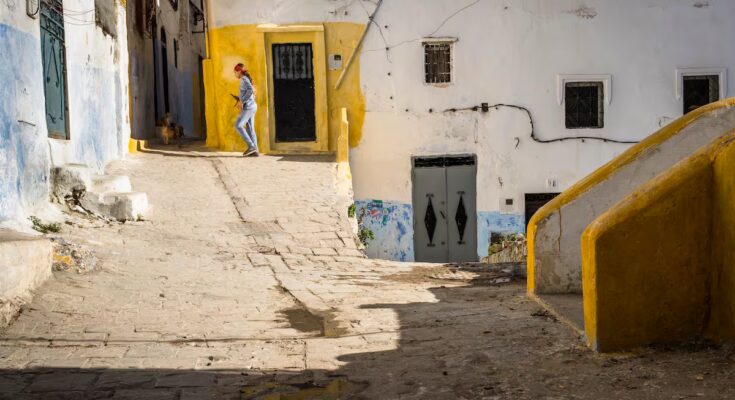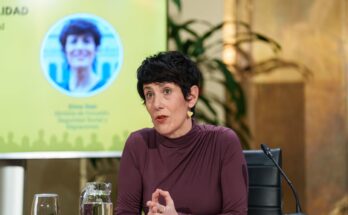The attempted marriage of a 14-year-old girl to an adult man shook Moroccan society last week, after images of the traditional engagement (which had no legal value) were spread on social networks in a town in the province of Kenitra, north of Rabat. Paralyzed after a complaint by the Federation of the League for Women’s Rights, the rural marriage celebrated with the Fatiha rite (the simple reading of a verse from the Koran) demonstrates the persistence of marriages of minors under 18 in Morocco. According to a recent report by the Superior Council of the Judiciary, last year judges approved 10,691 of these marriages, 98% of them between women, despite the Family Code banning them as a general rule since 2004.
The case of the teenager from Kenitra, as reported by the newspaper Assabahdemonstrates that the use of informal marriages makes a mockery of current legislation and violates women’s rights recognized by the 2011 Constitution (promulgated after the popular mobilizations of the Arab Spring) and by the international conventions signed by Morocco more than three decades ago.
In the reformist phase of the beginning of his reign, King Mohamed VI promoted the modernization of the Mudawana or Family Code in 2004 to prohibit marriages of minors under 18, while leaving the door open to those authorized by judges, without setting a minimum age limit.
At the end of 2024, a new amendment to the legislation on royal initiative was approved by the Council of Ulema (physicians of Islam) and limited the judicial permission exception for minor marriages to 17 years of age, permanently vetoing those younger than that. Almost a year later, this reform has still not been approved by Parliament.
Feminist associations asked last October that “the timid reforms” of the Family Code be put to an end once and for all. Grouped in the Moroccan Women’s Coordination – an alliance of over 60 organizations that includes leading women from the academic, economic and trade union world -, they call for legislation that “truly guarantees equality for citizens”, without limiting itself to “simple technical changes”, through the abolition of child marriage, according to a manifesto cited by the digital portal Expressed.
The feminist front highlights Mohamed VI’s initiative to update the Mudawana in his speech to the throne in July 2022, and the “important turning point” represented by the first reform requested by the king in 2004. It therefore hopes that the new Family Code marks a new milestone and is fully in line with the 2011 Constitution and with the UN conventions on the protection of women and children. “History will tell whether at this key moment we will choose justice and progress or whether circumstantial (political) calculations and conservative commitments will be privileged,” warns the feminist manifesto.
With less than a year to go until the next legislative elections, Moroccan parties are already negotiating with the Ministry of the Interior on the organization of the elections. In the 2021 elections, the Islamists of the Justice and Development Party (PJD) were removed from power after leading the government for the entire previous decade. Its current secretary general, former prime minister Abdelilá Benkirán, is thin on parliament, where his party has fallen from 125 to 13 seats. After returning to lead the PJD earlier this year, Benkirán raised the flag of opposition to the Mudawana reform in a bid to win back the conservative and religious vote in next year’s legislative elections.
As happened two decades ago, Mohamed VI had to carry out an arbitration again in 2024, this time entrusted to the opinion of the ulema. An attempt was made to prevent the tension between the conservative and Islamic sectors, opposed to the reform of the Family Code, and secular civil society and the feminist movement – which called for progress for women – from jeopardizing the stability of the Maghreb country. Twenty years ago, Islamists incited massive demonstrations against the Mudawana amendment, drawing more than a million participants to Casablanca.
Face of rejection
The Islamist Benkirán continues to keep open the front of the rejection of the reforms promoted by the sovereign of the Alawite dynasty, who as a religious leader holds the role of Commander of the Believers, a power recognized by Article 41 of the current Constitution.
“Marriage is the foundation and center of young girls’ lives,” said the PJD leader last summer, who had specified that he wanted to warn about what he considers “the phenomenon of the excessive delay in the average age of marriage”, which in Morocco is around 26 for women and 31 for men. He also alluded to the multiplication of “female solitude”, referring in a derogatory way to the so-called spinsters, among women with educational qualifications and who continue to work.
“I cannot authorize what God has forbidden, but neither can I prevent what the Almighty has permitted.” This was the message launched three years ago by Mohamed VI when he launched the second reform of the Family Code. The monarch then promoted the creation of a commission made up of jurists, theologians and representatives of the Administration to collect the amendments from parties, NGOs and civil society, before submitting them for the opinion of the doctors of the Islamic religion.
Exception to the rule
The Minister of Justice, Abdelatif Uahbi, insisted in December 2024, presenting the main lines of the Mudawana reform, that the legal age for marriage in Morocco was set at 18, with the only exception to the rule of those celebrated from the age of 17, under strict conditions – judicial authorization, medical-legal examination, investigation of the social situation – which guarantee its exceptional character.
Of the 16,985 requests for marriage authorization for minors submitted in 2024, 63% were granted by judges, a similar rate to that of the immediately previous year, when 20,192 requests were registered. Most of the cases last year refer to girls aged 17 (supported by justice in 70% of petitions) and 16 years (53%). Authorizations drop significantly for 15-year-olds (13%), while below this age they are very low (1.67%).
3.3% of marriages
Marriages between minors represent 3.3% of the 300,000 marriages celebrated every year in Morocco, without counting the cases of informal traditional marriages in inland and mountainous agricultural areas, as well as in the suburbs affected by the demographic inundation of large cities. The traditional Fatiha wedding can exceed 10% of registered links, according to estimates from a study published by the newspaper Le Matin in 2020.
The latest report from the Superior Council of the Magistracy also shows that minors who do not attend school receive a higher percentage of judicial authorizations (64%) than those who continue their studies (48%). 96% of the applications correspond to women who are not employed. And of them, 78% also come from rural areas, where judges accept, on average, four out of five requests.
“Until a girl has reached the age of 18, the age at which she has the legal capacity to make her own decisions, any sexual act committed on her constitutes rape,” lawyer and feminist leader Jadiya Ruggany told the weekly Tel That. “It is a violation legitimized by the Mudawana.”



